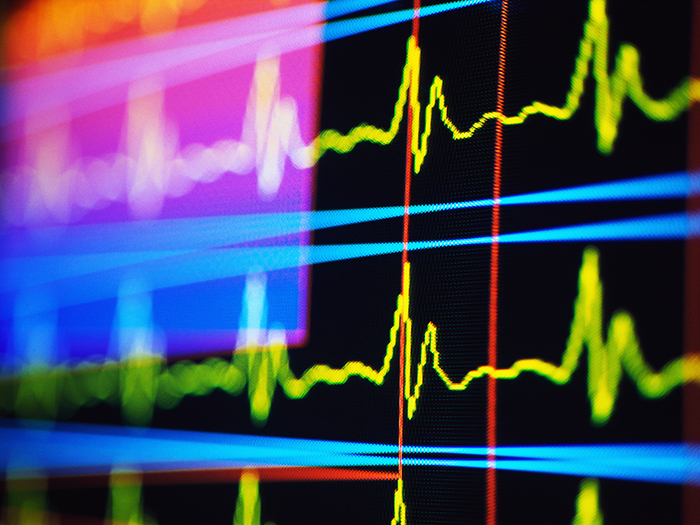Sponsored Content by FIGUR8
Degrees of Freedom: The Bright Future of Musculoskeletal Health Care Technology

When the electrocardiogram (ECG) was introduced to heart medicine over 100 years ago, the first commercially available machine, a table model of Einthoven’s electrocardiogram, was 600 pounds and took five people to operate.1 It was scarcely used across the healthcare system. Now ECGs are on every hospital floor and weigh in at only 8 pounds and they are one of the most commonly used tests in modern medicine.
In musculoskeletal health, we are going through the same revolution.
Up until now, objective measures of dynamic joint motion and muscle function have only been available in elite biomotion performance labs with a whopping price tag and large time commitment attached. That powerful musculoskeletal data is now accessible at any point of care, for any injured individual, through the easy to use and even easier to read bioMotion Assessment Platform (bMAP) by FIGUR8.
FIGUR8 is bringing the same level of ingenuity and objective, data-driven detail to the diagnosis and assessment of musculoskeletal health that the ECG has brought to our hearts.
Musculoskeletal disorders (MSDs) are some of the most common and costly injuries in workers’ compensation, comprising sprains, strains, tears, back pain and more.
To better understand the complexities of MSDs and their impact on injured worker recovery, the team at FIGUR8 is on a mission to enhance musculoskeletal health care through the power of bioMotion assessment technology, data and digital innovation.
“The future of musculoskeletal care is heading towards a more personalized, data-driven approach,” said Dr. Nan-Wei Gong, CEO, FIGUR8.
Technology plays an important role in the shift toward more personalized care, especially given its ability to collect and analyze large datasets in minutes. While point-of-care screening devices allow for the continuous tracking of injured workers’ progress outside of the clinical setting, collecting data is only one part of the equation. What’s done with the data that can really start to make change.
“The goal is to use this data and its findings to move away from a one-size-fits-all approach and instead provide targeted interventions that address each patient’s unique needs,” Gong said, “By creating a more accessible way to collect truly objective data on muscle health and function, the future of injury recovery is bright.”
Dr. Gong is a technology expert who founded FIGUR8 to harness biomotion sensing technology’s potential in revolutionizing musculoskeletal health. Under her visionary leadership, FIGUR8 has pioneered the bioMotion Assessment Platform (bMAP), granting providers, patients, and payers unparalleled objective insight into musculoskeletal health and injury recovery.
Here’s a look at how technology and data can change the game for musculoskeletal health care, its impact on injured workers and how partnership is at the root of successful outcomes.
What Data Can Do

Dr. Nan-Wei Gong, CEO, FIGUR8
Data is important when it comes to understanding recovery trends in musculoskeletal health. Having large quantities of information on the care pathways that have already been used builds a picture of what has worked, what has not and what could be a potential solution for care based on the patterns that came before.
“By collecting and analyzing vast amounts of movement data, it is now possible to identify patterns and predict potential health issues, ultimately suggesting personalized interventions that enhance overall wellbeing through artificial intelligence,” Gong explained.
When AI is integrated into the data collection mix, one often thinks of using this technology to create documentation and notes or interpret information based on past assessments and predictions. At FIGUR8, the team is taking it one step further, creating digital datasets in recovery — something Gong noted is largely absent in the current health care and health record creation process.
“Today, health records rely heavily on pain ratings from patients and descriptive words like ‘patient experienced pain’ or ‘patient has limited mobility.’ This type of information does not provide AI models with the necessary input for accurate future predictions,” she said. So FIGUR8 partnered with its providers to capture data in a more concrete way: via measurements derived from actual data on the recovery of muscles and joints rather than descriptive inputs.
“We’re incredibly excited about this complexity of data we are capturing with our provider partners and how they are now able to use it to provide personalized treatment plans and optimize outcomes.”
Patients at the Center of Care
Having vast amounts of data is exciting, especially for someone like Gong, who comes from a technology and data background, but the true north star that guides what FIGUR8 does is driving positive outcomes for the recovering injured patients.
“Our technology tracks a person’s recovery from injury to health by measuring their movement at different stages. It provides data on how an individual is progressing from being injured to an in-between state and finally to being healthy again,” she said. “This allows for a clear visualization of the recovery trajectory. It also enables us to provide feedback during the whole of their recovery, keeping the patient on track.”
FIGUR8 utilizes their bioMotion Assessment Platform (bMAP) technology to gather these data points. A compact, laptop-sized point-of-care screening solution can easily be transported and set up for data collection purposes at any appointment where the patient’s movements are being monitored or measured. It not only examines the point of injury, but provides insight on the mobility function of the body. This allows care management teams to get a clear understanding of how the injury has impacted the person holistically.
“This granularity of data has further enabled us to provide patients and providers with a comprehensive picture of an injury’s impact,” said Gong.
She used the example of a knee injury: Should a worker experience knee pain, the FIGUR8 technology can measure the range of motion in the knee as well as how it’s affecting the surrounding areas of the body via clear musculoskeletal function indicators. It looks at joint angles and overall ability of the injured area to function within a healthy normal range, as well as movement patterns. This understanding allows for clear understanding of where an injured individual is along their recovery journey.
“The information is then analyzed using advanced algorithms to generate a personalized report,” Gong said. “We don’t stop at just providing numbers, however. Our near-term product roadmap will offer guidance on areas that need improvement and help set realistic recovery timelines based on the patient’s unique condition – a true collaboration between technology with humans (providers) in the loop.”
It’s a holistic approach designed to benefit and empower the patient and their health care provider.
Partnering for a Bright Musculoskeletal Health Future
FIGUR8 is making waves in the musculoskeletal health care world. Partnerships with clinicians already extend to nearly every state, and the technology is being utilized for the wellbeing of patients.
“We see a lot of success in our provider partners using and continuing to use our technology, describing how they can now share and communicate progress with their patients, especially in the long and often painful recovery journey,” Gong shared.
The personalized approach supported by FIGUR8 ensures that treatment is both effective and efficient, resulting in a recovery time reduction of anywhere from compared to standard timelines outlined in ODG Guidelines, depending on the injury type. With FIGUR8, injured workers get back to full duty faster, reducing the impact on productivity and lowering overall claims costs.
And while the successes are evident, Gong also understands that in order to continue FIGUR8’s mission, there are still challenges to overcome. Namely, she said, the willingness to embed technology into the workflow: “People inherently understand what technology can do. The challenge lies in change management. It’s about the willingness of leadership to embrace technology and use it.”
However, she added, it’s a good challenge to have, because the results speak for themselves and show just how the data collected can help improve a patient’s recovery.
“Our mission extends beyond simply offering a product; it’s about driving change. We’re creating a standard of care that requires collaboration from multiple parties, including government, insurance companies and providers,” Gong said.
“This collaboration is critical in assessing how we currently do things and how we use this program as the first step to change how musculoskeletal care works.”
To learn more, visit https://www.figur8tech.com.
1 https://www.pfizer.com/news/articles/flashback_the_first_ecg
![]()
This article was produced by the R&I Brand Studio, a unit of the advertising department of Risk & Insurance, in collaboration with FIGUR8. The editorial staff of Risk & Insurance had no role in its preparation.








